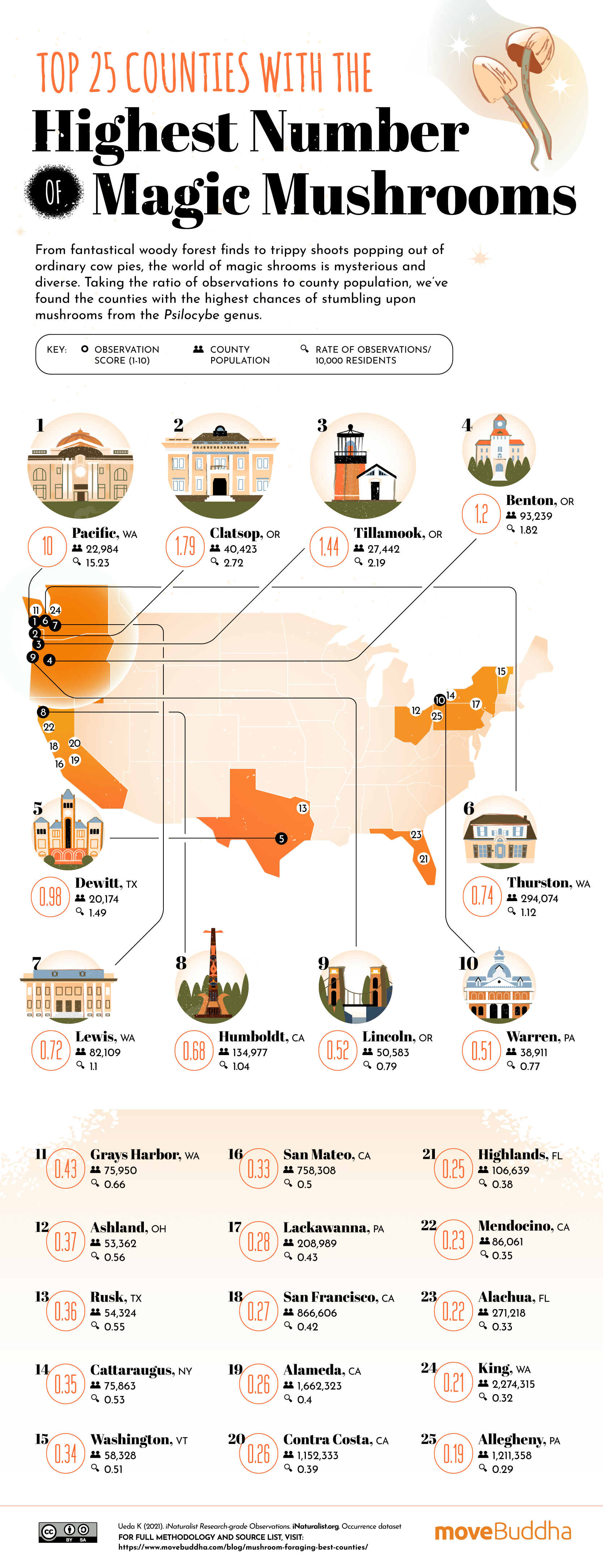Moves towards psilocybin decriminalisation in the US have helped make this mushroom foraging season more magical than usual.
Mushroom foraging has faced a resurgence in popularity since the world went to lockdown in spring 2020.
Beginners and mycophiles alike have become increasingly fond of bettering their mushroom knowledge while simultaneously exploring the outdoors and being in nature. Coupling the mental health difficulties many faced during the pandemic with an increased interest in spending time outdoors to escape crowded city-centers, it is not surprising that the crossover of interest in mushroom foraging has converged with an interest in uncovering those of the psychoactive nature.
Many studies have suggested that the use of psychedelics has increased since the beginning of the pandemic, some states and cities are loosening laws around the consumption (see here, here, and here), and the latest release of Newsweek features a declaration that “Magic Mushrooms could be the biggest advance since Prozac.”
For those looking to lean into this hobby or perhaps just curious where mushrooms grow in the wild, a new study from moveBuddha has researched where every species of mushroom ever has been found in nature, and compiled a list of the 25 Best U.S. Counties for Mushroom Foragers.
The (mostly illegal) cure to depression might be growing in your backyard and where it IS legal.
MoveBuddha’s study included research to narrow down the top 25 counties with the best chances of finding mushrooms from the Psilocybe genus – A.K.A. psychedelic mushrooms.
Interestingly enough, psilocybin (the psychoactive substance in psychedelic mushrooms) is fully illegal in most of the counties where they naturally grow. See below for the 25 counties with the most abundant psychedelic mushrooms.

Full map and methodology of study can be found on moveBuddha’s website.
That’s not to say that some progress hasn’t been made towards nationwide decriminalisation. In November 2020, Oregon became the first state to fully decriminalise psilocybin for recreational use and legalise it for medical/therapeutic use.
More and more research is being done to demonstrate the benefits of using psilocybin in therapy as a natural substance to treat depression, anxiety, addiction, and PTSD, working to remove the negative stigma on psychedelic mushrooms and their place in society. Between Oregon’s legalisation initiatives and the abundance of new research being done to support psychedelics as a tool for healing, there seems to be hope for the future of legalising psilocybin in other U.S. states.
Though Oregon is the only full state to decriminalise magic mushrooms, these are all of the cities or counties in the United States where psilocybin is currently decriminalised (ordered by date):
- Denver, Colorado – May 2019
- Oakland, California – June 2019
- Santa Cruz, California – January 2020
- Ann Arbor, Michigan – September 2020
- Oregon – November 2020
- District of Columbia (Washington D.C.) – November 2020
- Washtenaw County, Michigan – January 2021
- Sommerville, Massachusetts – January 2021
- Cambridge, Massachusetts – February 2021
- Northampton, Massachusetts – April 2021
Decriminalisation is beneficial for everyone
This recent surge of decriminalisation is good news not just for the population of magic mushroom users in the U.S. but for anyone who has suffered from or been impacted by mental illness. According to the National Alliance on Mental Illness in the US alone 1 in 5 adults have experienced mental illness; according to the World Health Organisation (WHO), around 5% of adults around the world suffer from depression.
Decriminalisation would not only prevent those foraging from getting arrested, it would also open doors to greater research into psysocybin’s potential as a more affordable solution for treating depression, anxiety, and even certain addictions.
For those interested in this movement, check out Decriminalize Nature. This organisation is an advocate for decriminalising plants and fungi and informing individuals about the value of entheogenic plants.
Foraging advice: When in doubt, throw it out!
It’s important to note, that as many edible and psychoactive mushroom species there are, there are just as many highly toxic mushrooms growing in the wild, and some have very nuanced differences in appearance.
For example, mushrooms in the Psilocybe genus (which is psychoactive) have brown spore prints with a purplish undertone, while a highly poisonous species called Pholiotina filaris has brown spore prints with a rusty undertone. This subtlety in hue could literally mean life or death upon ingesting. Always always remember – if you are unsure whether or not a mushroom is poisonous, do not consume it. Psychedelic fungi master Paul Stamets compiled a comprehensive guide to identifying every species of mushroom that is useful for research before foraging.
There is a large community of mycophiles eager to share mushroom hunting tips, recipes, and prime locations that they have come to discover over the years. Wild Mushroom Hunting and the mycology subreddit are two great online forums to tap into. If you get really into the practice, you may even be inclined to plan a move to one of the top counties in the U.S. for foraging (or perhaps a city where psilocybin is decriminalised). As we continue through the ages of the psychedelic renaissance, mushroom foraging is continuing to grow momentum as a hobby and, for some, a lifestyle. Do your research, stay safe, and happy hunting.
Mercedes Martinez is a writer and marketing specialist for Green Flag Digital and is currently based in Newport Beach, CA. She specialises in conjuring up unique and creative approaches for PR Strategy and implementing these strategies with flair.


